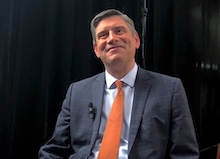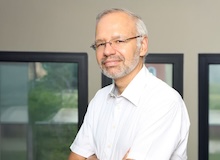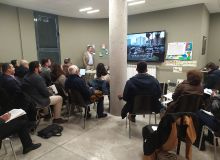


The work of biblical scholarship, interpretation, teaching, and learning is the work of the body of Christ, and cannot be responsibly performed by a machine.

AI should help us address ways to collaborate with communities to facilitate spiritual transformation, growth in Christ, and help the emerging church grow and mature.
.jpg)
Artificial intelligence, conflict resolution, evangelical theology, and the centrality of the Bible in the Christian faith are the topics of four three-hour online masterclasses offered free of charge by the Forum of Christian Leaders with speakers affiliated with the European Leadership Forum.
.jpg)
I'm excited by how helpful and efficient Ai tools are. Yet they work best when used by someone already shaped by years of training, when one’s skills and relationship with the Bible are essentially in place.
.jpg)
The revival of interest in faith, technological advances, polarization, and the importance of discipleship were topics of conversation for the 700 participants in Benidorm at GBU Spain's major event.

Artificial Intelligence is not a panacea, but its potential to transform the lives of children with additional needs is undeniable.
.jpg)
Six in ten young people in Germany believe that using social media worsens mental health. A large majority of adults believe that children under 16 should not have online profiles.

Will Graham, grandson of the well-known 20th-century evangelist, reflects on the challenges of technology and shares his experiences in evangelism.

Measures include age verification on pornographic sites and criminalising the creation, possession and exchange of child sexual abuse material generated by artificial intelligence.
.jpg)
More than 300 guests attended the celebration in Bern. The Christian vision of the early days remains the same, but editor-in-chief Florian Wütrich called for courage in navigating the new context of AI.

The shared love for Christ and the desire to make Him visible gives participants the courage to move beyond their differences, to work together and to seek mutual understanding.

I am convinced the future of friendship is human. Better a friend that tells you the truth than the fake praise of a line of code.

In his latest book, an award-winning cardiologist with a long career critically questions the prevailing thinking in the Western world on 15 fundamental issues. Interview with Manuel Martínez-Sellés.
.jpg)
A report from the European Freedom Network Bridge 2025 Conference held in Austria.
Cropped(1).jpg)
We all struggle over how to channel or not channel information that comes our way. The journalist’s job adds yet another layer of complexity.

We attended the Open Doors press conference in Madrid to get the stories and context of the most widely cited report on persecution of Christians globally.

Jesus talked of wheat and tares growing up together. Here is a random sample of both in the last 25 years.
A gathering of ministry and church leaders in Madrid, highlights the adaptation process that is taking place within the Spanish evangelical sphere.

Are we seeing the dawn of thinking machines? And what does this mean for mission, for Christianity, and the world?
.jpg)
I came from the future because in Seoul at L4, I had the opportunity to connect with issues of relevance for the coming years of the Global Church.
.jpg)
While AI does not pose an existential threat to humanity, we must be aware of the concerning ways it is shaping our understandings of God, ourselves, and the world around us.
.jpg)
The EU passes a groundbreaking “Artificial Intelligence Act”. It bans ‘social scoring’, emotional recognition at the workplace, and “deceptive techniques that distort behaviour”.
.jpg)
Charlie Catlett, an experienced computer scientist who explains Artificial Intelligence to non-experts, speaks to Evangelical Focus. “Chatbots are non-persons, and you shouldn’t be having a personal relationship with a non-person”.
.jpg)
Computer scientist Charlie Catlett comments on the cascade of new technologies coming to our mobile devices. “Those who will implement the best applications of AI are now probably in high school”.

Be aware of the role of artificial intelligence in elections, especially in your social media timeline. Truth and trust should go hand in hand.

Las opiniones vertidas por nuestros colaboradores se realizan a nivel personal, pudiendo coincidir o no con la postura de la dirección de Protestante Digital.